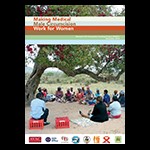As voluntary medical male circumcision (VMMC) for HIV prevention is implemented, civil society groups are playing key roles as communicators, advocates, policy advisors, and more. On this page, you will find profiles of advocates and highlights of extraordinary advocacy projects. Please email AVAC or the webmaster if you have a story to share.
Advocate Profiles
In Memoriam: Manasseh Phiri (1958–2019)
Matovu Zachariah Jamil, VMMC champion and health worker hero
Soccer player Dennis Yuki Masina becomes a health ambassador for medical male circumcision
African chief evangelises about adult circumcision
The Washington Post, 2 August 2013
Advocacy Projects
Why I want to advocate for HIV prevention in Lesotho
Lepheana Mossoane, a 2016 AVAC Fellow hosted by Jhpiego, explained: "Lesotho has the second highest HIV prevalence in the world. As VMMC is a scientifically proven tool to combat HIV, Jhpiego is working with the Ministry of Health in Lesotho to circumcise 300,000 men by 2017. So, as an HIV educator and filmmaker, I can use the power of film to advocate for VMMC so as to effectively create demand and facilitate HIV education. The goal is to combat new HIV infections so that Lesotho, as a poor country, will no longer have to divert millions in funds and foreign aid into HIV/AIDS treatment." His work as a fellow includes the following:
What’s Up HIV: Reporting Live from SA AIDS 2017
Consultative Meeting on Medical Male Circumcision as an HIV Prevention Strategy
Gift Trapence, an AVAC HIV prevention research advocacy fellow hosted by the Center for the Development of People (CEDEP) in Malawi, explored perspectives on Lepheana Mossoane 2016 AVAC Fellow, hosted at Jhpiego, Lesothoawareness of male circumcision for HIV prevention among gay men and other men who sex with men (MSM) in Malawi. The three randomised controlled trials that confirmed male circumcision as an effective intervention for HIV prevention all focused on HIV risk via vaginal sex, yet anal sex is also a risk factor—and of particular relevance to gay men and other MSM worldwide. Ensuring that gay men and other MSM understand what current data say and do not say about the protective effects of male circumcision during anal sex is critical. In 2010, Mr. Trapence used information from focus group discussions, workshops, one-on-one engagements, and desk reviews to develop different materials to inform and engage African MSM on medical male circumcision as an HIV prevention strategy. These materials have also been used in meetings with researchers, government, and policymakers as part of advocacy to ensure inclusion of African MSM priorities in HIV prevention research and programming. For example, Mr. Trapence presented his findings at a consultative meeting on medical male circumcision for HIV prevention hosted by CEDEP (see report under Resources). The fellow was also nominated to be part of the team that developed Malawi’s new HIV/AIDS strategic plan, and he helped influence the inclusion of MSM priorities in this new plan.
Rolling Out Medical Male Circumcision: Making it Work for Women and Promoting Gender Equality
Leader Ngooyi Kanyiki, an AVAC HIV prevention research advocacy fellow, spent the year working to facilitate the integration of gender equality and male circumcision messaging,education, programming, and policy. The South Africa-based Sonke Gender Justice Network hosted Mr. Kanyiki as he worked with a variety of stakeholders—medical professionals, researchers, the media, and civil society groups, among others—to examine male circumcision for HIV prevention in South Africa. See an article on male circumcision and gender equality by Mr Kanyiki under Resources.
Involving Civil Society Voices in Considering the Roll-out of Male Circumcision for HIV Prevention in Rwanda
Alliance Nikuze, an AVAC HIV prevention research advocacy fellow hosted by the Institute of Human Virology of the University of Maryland School of Medicine (UMSOM-IHV) in Rwanda, engaged grassroots communities to discuss male circumcision for HIV prevention. One of the 10 critical elements identified by WHO/UNAIDS that will play a key role in male circumcision scale-up in the priority countries (including Rwanda) is leadership and partnership building. As part of her advocacy fellowship, Ms. Nikuze held consultative meetings with civil society groups that work on issues relating to HIV/AIDS, women’s health, and youth, faith-based health groups, and minority groups. Throughout 2010, she used these conversations to engage, educate, empower, solicit, and provide feedback from different stakeholders. Her advocacy also included travelling to Arusha for a WHO East Africa regional male circumcision consultation as well as many other meetings. Her work culminated in a report highlighting key questions and issues that may emerge as Rwanda moves ahead with its plans to implement male circumcision for HIV prevention. Ms. Nikuze presented this report to key stakeholders that included civil society organisations (CSOs), the Rwanda Ministry of Health, the National AIDS Control Commission (CNLS), the Treatment and Research Centre (TRAC), the Joint United Nations Programme on AIDS (UNAIDS), the United States Agency for International Development (USAID), the Centers for Disease Control and Prevention (CDC), and Jhpiego. She organised it to allow civil society groups to share their concerns on male circumcision as an HIV prevention tool; to identify roles and responsibilities of CSOs and other partners; and to raise awareness of ongoing HIV biomedical prevention research. There was strong appreciation for civil society’s engagement in research, and this work provided an opportunity for future engagement and collaboration.
Learn more about AVAC's HIV Prevention Research Advocacy Fellowships.




